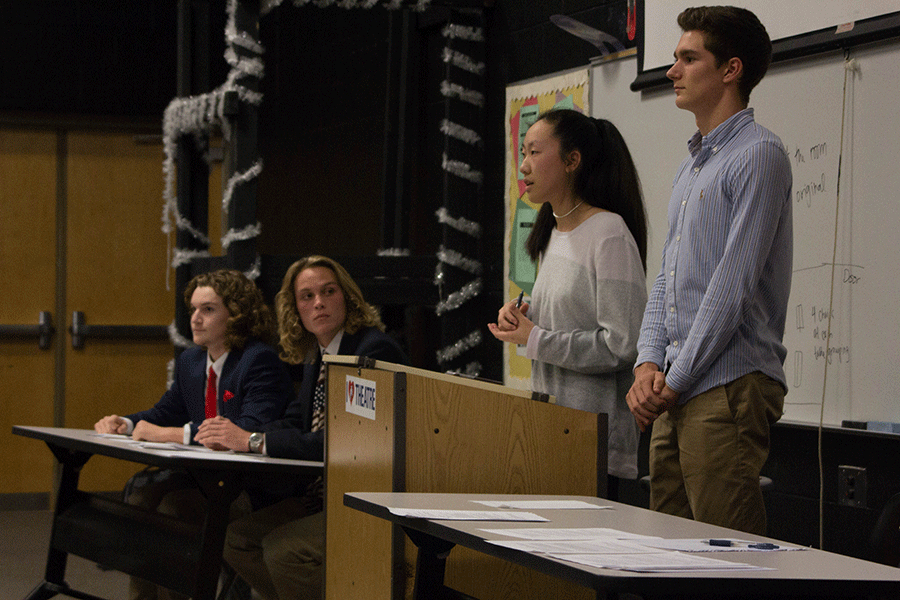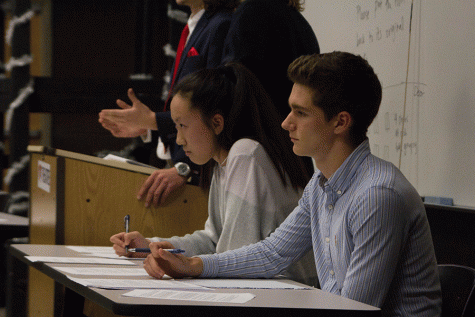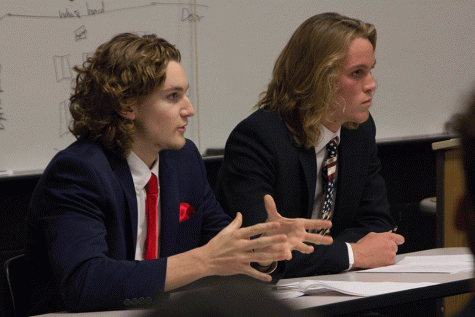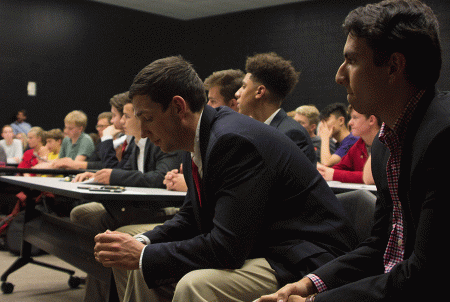Young Democrats and Young Republicans Clubs hold first debate
November 22, 2016

Erb and Flynn watch Shi and Pultz-Earl present their argument on student debt.
More than 100 students crowded the Black Box Theater on Nov. 3 to watch the first ever debate between the Young Democrats Club and Young Republicans Club. For almost an hour and a half, debate teacher Jason Moore moderated a staged dispute that avoided many of the personal attacks seen during the presidential debates.
“The students that participated conducted themselves in a more professional manner than the [presidential] candidates,” Moore said. “I was also impressed with the number of students that chose to take time out of their day to watch the debate.”
Junior Zai Erb, who represented the Young Republicans, believed the debate could serve as a space for students to learn about opposing views in a respectful setting.

Ting Ting Shi and Ian Pultz-Earle take notes while the Young Republicans present their rebuttal. Shi was impressed with her club’s performance during the debate. “I do say, that just because I’m on the Young Democrats, that I thought we won.” Shi said.
“Sometimes when you get into political debates at school, it can get heated,” Erb said. “So we wanted somewhere where we could come and listen to your views and the alternative views and just have something educational.”
Junior Ting Ting Shi, who debated for the Young Democrats, thinks that an organized debate at school gives people with an opinion a chance to speak up.
“They’re important just to get voices heard, and to have students participate in real-life things,” Shi said. “It would be even more helpful to get continued debates, not just over politics, but over other contentious issues that a lot of people in this school feel very passionate about.”
Two students represented each club during the debate. The Young Democrats sent Shi and senior Ian Pultz-Earle, while the Young Republicans chose senior Jackson Flynn and Erb. Shi and Pultz-Earle had the advantage since they are on the debate team and have been in a similar competitive environment.
“Ting Ting and I are both experienced policy debaters and are used to speaking.” Pultz-Earle said. “That’s what we do, and [the Young Republicans] weren’t as used to that.”
Pultz-Earle believed the Young Republicans were anxious going into the debate since they lacked the experience. Erb agrees that he was nervous before the event.
“I watched the video of the debate and I [saw] myself stuttering,” Erb said. “We were scared going into the debate.”
Pultz-Earle thought the lack of experience did not discourage the Young Republicans. He was impressed by how much material his opponents presented.
“[Their lack of experience] only meant they worked really hard to get prepared, because they didn’t want to seem foolish in the debate,” Pultz-Earle said. “That definitely worked. They had good information and they seemed ready to have a good debate.”
The debate covered domestic topics like climate change, early childhood education, paid maternal leave and the Affordable Care Act. Some students on Twitter criticized Moore for choosing topics in favor of the Young Democrats Club.
The Young Republicans Club believe the choice in topics was an issue of time.
“Mr. Moore did a great job,” Flynn said. “It was really just a time issue that we didn’t get to talk about a lot of Republican strongholds like the gun rights, Syria and the Middle East… It just came down to time and I think the moderator did fine.”
Moore explained that he tried to avoid possible bias, but believes it is a challenge to do so.
“I cannot control how people feel,” Moore said. “There will always be critics. The criticism may even be warranted, but I did my best to make sure I was fair to both sides.”
The Young Republicans leveraged on the topic of The Affordable Care Act, suggesting to scrap the program in order to put federal funding into early childhood education.

Erb and Flynn respond to question asked by an audience member. “We shouldn’t stop having civil discussions and sharing viewpoints, just because the election is over,” Moore said. “I would attend another debate between these groups.”
“We believe that the government should be able to help families who cannot afford these private pre-schools,” Flynn said. “This should be funded via cutting government programs such as Obamacare, which is a failure.”
The Young Democrats, on the other hand, made points on the topic of student debt by proposing the federal government pressure states and universities to make changes to school policies.
“We want the federal government to invest in higher education and have states re-invest in this higher education,” Shi said. “For example, increasing the percentages of racial and ethnic minorities [in state colleges].”
Aside from the previous topics of climate change and student debt, the debaters ended up agreeing more than they expected. Pultz-Earle thought there could have been more disagreement if the topics focused on more than domestic issues.
“It ended up focusing a lot on social issues and things that affect us domestically,” Pultz-Earle said. “So maybe we agreed a little bit more on that, topics like child care, early education. I think we may have had more differences on other issues like guns or foreign policy.”

Young Republicans club members Dale Miller and Sayuz Thapa watch the debate. Young Republicans Club members arrived at the debate wearing suit jackets.
It was not until after the debate when the two clubs showed the most hostilities. Senior Meredith Shaheed live tweeted for the Young Democrats during the debate. She explained that she used the account to provide commentary on the debate on behalf of the Young Democrats Club and that nothing was meant to be a personal attack.
“I tweeted like I would a presidential debate, so obviously we have a political alignment on the Young Democrats Club,” Shaheed said. “It was not meant to be aggressive or a personal attack. There’s a reason I cited everything as ‘Young Republicans Club’, because I didn’t want this to be a personal reflection on them. It was more about the ideas of their club and how they felt on things.”
The Young Republicans Club found issue with many of the tweets sent out by the Young Democrats.
“Every mistake we made ended up on Twitter afterwards. We had a good debate…” Erb said. “We got our points across and we went on Twitter and saw [the tweets] and people got emotional after that, and just annoyed.”
The Young Republicans responded to many of the Young Democrats tweets, but took down their responses shortly after.
“There wasn’t anything offensive or degrading,” Flynn said. “[We were] simply correcting false information. One [was about] us not having enough time for all of our topics, and one thanking the YDC for the debate.”
Erb said the club discussed what was important to tweet and what was not.
“We talked about not tweeting stuff out of emotion and really think over the tweets because that’s our appearance,” Erb said. “From both sides there was some Twitter stuff going on that was not what we wanted the debate to be.”
Even though the encounter on Twitter may have ended the debate on a bitter note, debaters from both clubs agreed the debate was informative.
“It was very educational for both clubs and for the people watching the debate.” Shi said.
Flynn brought up that it is important to share opposing viewpoints so students will make the right decision on who to support politically.
“My brother’s usually like ‘Trump this. Trump that’ but then he came to the debate and he was like ‘Wow, I didn’t know a lot of this stuff you guys were talking about and how that factors into the election’,” Flynn said. “It’s important to educate kids so they can grow up to be smart, well-educated adults that make wise political decisions.”
